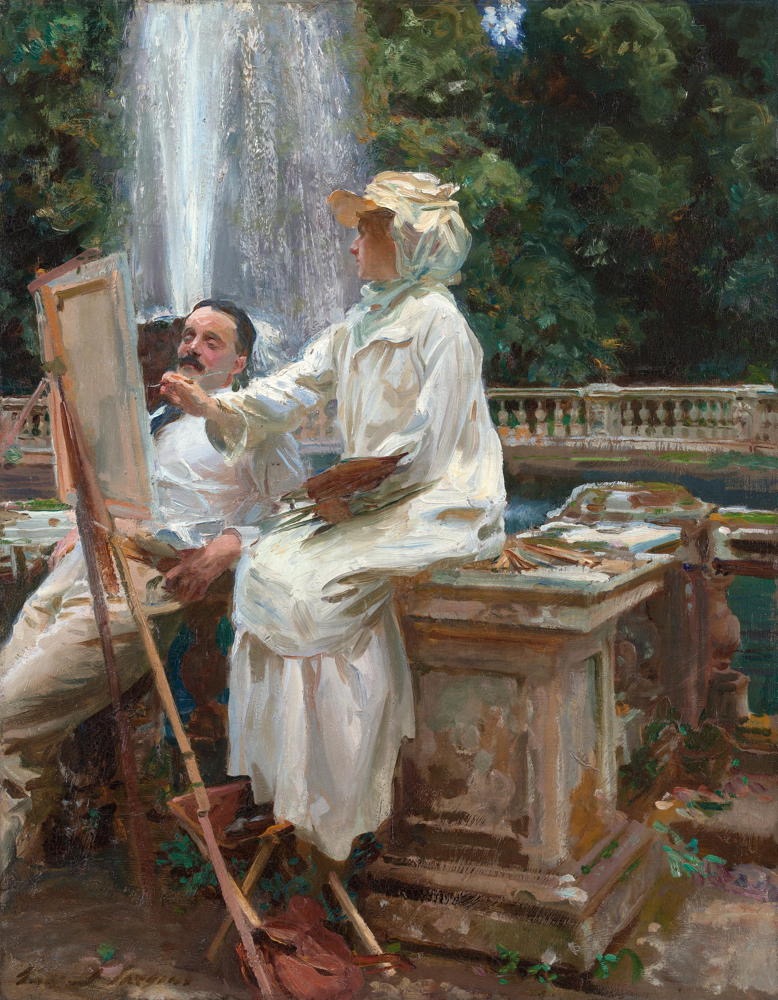Cohorts

John Singer Sargent:
The Fountain, Villa Torlonia, Frascati, Italy (1907)
" … not merely as mythical rugged individuals."
The typical Fambly tree tells much less than half a Fambly's story, for family constitutes only part of anyone's usual Cohort. We're unavoidably rooted in Fambly, but most of us choose to stray from the founding fold into different country. We marry out of the Fambly, or most of my forebears did. We also often work far away, seeing even our closest blood relations perhaps only on holidays, a scant few days each year, if that. We usually most distantly relate with those to whom we're most closely related, once intimate but later almost strangers. We retain those traits and characteristics native to our Fambly. After all, we did learn the fundamentals together. We probably retain speech and behavior patterns we learned before we became aware of learning anything, our relations appearing in common quirks and similar phrasings.
We spend most of our time on this Earth with Cohorts: work buddies, acquaintances, friends, and neighbors. One distinguishing feature of Cohort relationships lies in the fact that we can choose them. Unlike Fambly, Cohorts can be chosen, selected or rejected upon other than birth randomness. Most of us retain a core collection of Cohorts, our friends and confidants, with whom we remain on intimate terms, unlike those we ever imagine extending to a sibling or parent. To closest Fambly, our life should rightly stay somewhat of a mystery. Who could say why I moved away rather than staying closer to the old hometown? Who knows why I later chose to forsake the out-there world to return to my hometown? Even when I moved back home, I became closer to my Cohorts than I ever did to my Fambly there.
I know of no way to create a Cohort Tree similar to a Fambly Tree, though the idea intrigues me. I know writers create biographies of Cohorts, the colleagues of Feynman or Einstein, and speculate upon the true nature of those working relationships. These works never mention the protagonist's relationship with his actual brother, but rather his more extensive and historically interesting relationships with his collaborators, his band of brothers. Woe be it to any budding leader to fail to create a Cohort, for no famous or successful person ever amounted to very much of anything without first attending to developing a cadre upon whom he could depend—the Fambly tree's mostly mute on this subject.
I know this principle holds just as true for my forebears as it ever did for me, but only in rare instances have I managed to find even hints of these sorts of relationships for them. Except for the more noble and royal ones, the rest left no traces of whom they relied upon and thrived alongside. The frontier neighbor who came when called to defend the homestead. The wagon master who became a lifelong friend once they'd survived The Oregon Trail together. The fellow passengers on a scurvy-ridden Atlantic passage most likely stayed life-long compatriots—likewise, those who served in The Continental Militia together during the Revolutionary War. Even the spare co-worker likely had deeper influence than the parents of most of those who came before me.
I have been looking for records showing who else was on those ships. Census records disclose the names of neighbors who often settled in close proximity to their traveling Cohorts. The Muse noticed that one thread of the Fambly seemed to travel through the same territory as Dan'l Boone's clan. It might be possible to create proximity maps that show just how close those families were. It seems unlikely that one wouldn't at least become familiar with everyone within a few miles of one's wilderness home. It seems most likely that everybody would have joined in some not-so-secret society to defend and support each others' pioneering efforts. Not one of them was an island, not even those who traveled with their extended families in tow. We go out into the world together, rarely alone. Understanding how my forebears actually lived and survived depends upon appreciating the Cohorts they chose, for they survived together, not merely as mythical rugged individuals.
©2024 by David A. Schmaltz - all rights reserved


